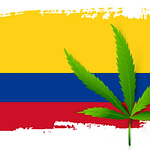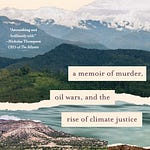This week, I joined Richard McColl for a special episode of the Colombia Calling podcast: we had the privilege of interviewing Owen Pinnell about his new documentary for the BBC World Service, exposing Colombia’s state oil company and its (dire) environmental and human rights record.
Owen’s documentary has made waves both here in Colombia and further afield: the film reveals Ecopetrol’s hundreds of oil spills, polluting rivers and wetlands relied upon by fishing communities as well as numerous endangered species.
Local activists have had to flee and, as Owen tells us, the BBC team also received threats while filming - experiencing first-hand the murky ties between the fossil fuel industry and paramilitary groups.
All of the links to the podcast here, and I’ve embedded the documentary itself below - it is well worth a watch.
Now available on Spotify, Apple, Soundcloud, YouTube, and wherever else you get your podcasts - and audio here:

This new BBC documentary, ‘Petroleum, Pollution & Paramilitaries,’ reports that Colombia’s state hydrocarbon company Ecopetrol ignored alarming pollution at and around its facilities.
The alarm was first raised by a former-employee, Andrés Olarte, who provided hundreds of documents evidencing unaddressed oil spills, toxic chemical leaks, and dangerous gas emissions. Olarte began to receive threats and subsequently fled Colombia, fearing for his life.
A case now dubbed the ‘Iguana Papers’ (Ecopetrol’s logo is an iguana), this new investigation into the company’s practices alleges failure to report methane emissions and pollution of the wetlands of the Magdalena River - as well as surveillance of local environmental activists who were critical of the company’s activities.
Toxic elements including heavy metals have been found in waters near the Ecopetrol refinery in Barrancabermeja, Santander: some medics have linked serious congenital conditions seen in newborns in the area to exposure to these chemicals.
Members of the local community also believe that oil pollution is affecting wildlife in and around the river - home to turtles, manatees and spider monkeys; the nearby wetlands are a protected habitat for jaguars.
The report was produced in association with the US civil society group Environmental Investigation Agency, which also confirmed health risks to communities due to the company’s failure to reduce emissions close to homes, markets, and schools.
Ecopetrol responded to the documentary by denying that it had deviated from ‘its high ethical, legal and environmental standards,’ and claiming that the environmental problems signalled by whistleblowers had since been resolved.
Find out more in this BBC report, which sums up the findings of the documentary - or watch the documentary here:












